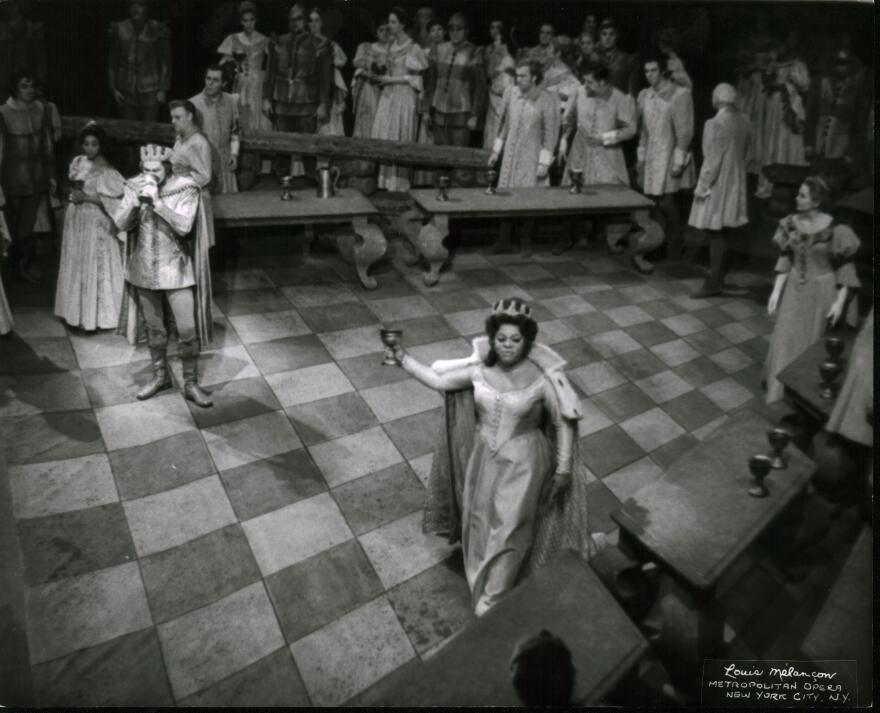A storm brews in the orchestra, awash in thunderclap chords. As the clouds disperse, the prima donna makes her entrance, reading a letter from her husband, prophesying his ascent to the throne. She is Lady Macbeth, and as portrayed by Martina Arroyo at The Metropolitan Opera, she vaults up to a fearless high C — with a terrifying laser beam of sound — as she sings Ambizioso spirto tu sei, Macbetto. (“Macbeth, you are an ambitious man.”)
This moment reaches us from 50 years ago almost to the day: Feb. 3, 1973, when The Met captured a crackling performance of Macbeth, Verdi’s operatic adaptation of the Shakespeare play. It’s the latest matinee broadcast from the Toll Brothers-Metropolitan Opera International Radio Network, which draws from the archives throughout February; you can hear it at the usual time, Saturday at 1 p.m. And it offers an opportunity to marvel anew at Arroyo, the great American soprano, who turns 86 this week.

A generation of important American singers of color arrived at The Metropolitan Opera at midcentury, after the legendary Philadelphia contralto Marian Anderson became the first Black singer to perform a major role there in 1955. Arroyo joined a historic generation of opera stars — including Leontyne Price, almost exactly a decade her senior —in pursuing the path forged by Ms. Anderson, and laying a foundation for Black excellence at the Met.
Arroyo made her Met debut in 1959, in the offstage role of the Celestial Voice in Verdi’s Don Carlo. She was an ensemble member, singing a steady diet of that role sprinkled in with Ring Cycle Rheinmaidens, Valkyries, Forrest Birds, and Norns. For many American singers, trying their luck in Europe in bigger roles allowed them to break out of comprimario roles at The Met. This was the case for Arroyo; after she debuted at the Zurich Opera in the title role in Aida, Europe’s major opera houses opened their doors to her, and The Met followed suit.

Born and raised in Harlem to Black and Puerto Rican parents, Arroyo finally got the chance to make a splash in her hometown in 1965, when she was a last-minute replacement for an indisposed Birgit Nilsson in the title role of Aida. Arroyo’s triumphant performance announced the arrival of a major Verdi soprano at The Met; its general manager, Rudolf Bing, promptly offered her a contract to join the company’s roster of principals.
No more comprimario roles for her, Arroyo demonstrated her versatility in repertoire including Mozart, verismo heroines, Strauss, and newer works. She was the first Black singer anywhere to perform the role of Elsa in Wagner’s Lohengrin. But what makes Arroyo’s voice so special is its voluptuousness on the outside, with a steely core at the center; she is a true spinto soprano ideal for the music of Giuseppe Verdi. With his operas, she secured her legendary status as Aida, Leonora (La Forza del Destino and Il Trovatore), Amelia (Un Ballo in Maschera) and others — including Lady Macbeth.
Verdi’s Macbeth received its Met premiere in 1959, with a bit of attendant drama, as Austrian soprano Leonie Rysanek was called in to replace Maria Callas. When the production was remounted in 1973, Arroyo made headlines as the ambitious and conspiratorial Lady (as she’s called in the score). Writing in The New York Times, Harold C. Schonberg opined that Arroyo’s performance as Lady Macbeth was “never less than warm and exciting. Hers is a big, velvety, commanding voice, backed by a solid technique (the trills in the Brindisi were something few contemporary dramatic sopranos attempt), and used in an expressive manner.”

Verdi famously wrote: “I would like Lady Macbeth to be ugly and evil… to have a harsh, stifled, and hollow voice.” If Arroyo’s glamorous timbre seems at odds with Verdi’s diabolical ideal, it’s a joy to hear this music sung in the broadcast with such technical security. There is no trace of a wobble, her voice is fully integrated from chest register to gleaming high notes, and there is plenty of that steely spinto strength in its core, which adds to the connotation of evil.
Arroyo is well matched in the production by the great American Verdi baritone Sherrill Milnes in one of his signature roles, with Ruggero Raimondi as Banquo and Franco Tagliavini as Macduff. Francesco Molinari-Pradelli conducts.
In addition to her opulent voice and onstage elegance, Arroyo is known for her quick wit and self-deprecating style. Her charm and sense of humor made her a regular visitor on The Tonight Show Starring Johnny Carson, and even on an episode of The Odd Couple. In 1970, she joined moderator Edward Downes and her colleagues Dame Joan Sutherland and Marilyn Horne for a riotously funny singers’ roundtable during a Met broadcast intermission that kept everyone in stitches.
Arroyo announced her retirement in 1989, after singing the title role in Turandot. However, she returned in 1991 for the world premiere of Leslie Adams’ opera Blake. She remained active as a teacher and with master classes, and in 2013 she received a Kennedy Center Honor for artistic achievement. In her introduction, Supreme Court Justice Sonia Sotomayor took a moment to properly define a salient term. “Long before ‘diva’ took on a different meaning, it was used sparingly, to describe only those opera singers who took us to another world,” she said. “Now, that’s the kind of diva I’m talking about. That’s Martina Arroyo.”
Listen to the Toll Brothers-Metropolitan Opera International Radio Network at 90.1 FM, on the WRTI Mobile App, on your smart speaker, or streaming at WRTI.org.


